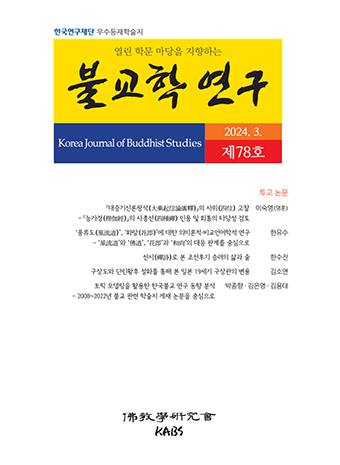Abstract
References
Sorry, not available.
Click the PDF button.
Information
Sŏngch'ŏl ranks among the most outstanding monks of the 20th century. He served as meditation master of the famous Haein Monastery (1967-1993) for twenty-six years, including twelve years (1981-1993) as Patriarch of the Chogyejong, by far the largest Korean Buddhist order. But his place in Korean Buddhist history is not without controversy, particularly his utter rejection of the then well-established “sudden-gradual” doctrine of awakening and practice advocated by Master Chinul (1158-1210). The effort to replace it with his own “sudden-sudden” doctrine has so alienated the vast majority of Korean Buddhist scholars that it is difficult to find balanced accounts of Sŏngch'ŏl's significance in histories of contemporary Korean Buddhism. In the first part of this paper, I use a dialectical approach, based on the Buddha's doctrine of the middle path, to address seven of the most common misunderstandings regarding Sŏngch'ŏl's life and thought. My argument is that Sŏngch'ŏl' must be seen not as an academic, but as a religious figure who dedicated his life to the practice of meditation. The second part examines both the doctrinal and the socio-political background of Sŏngch'ŏl's rise. Here I argue that the roots of Sŏngch'ŏl's sudden-sudden teaching were more religious than academic. The teaching arose not from an objective re-interpretation of Chinul, but from the need to reform the Korean Buddhist tradition that was in a deep state of disarray after several centuries of decay. The teaching was something of a doctrinal coup d'état at the Haein monastery, dating from 1967. The third part compares the two contending paradigms in the Korean “sudden-gradual” controversy, suggesting that the differences are more of emphasis than substance. Chinul devotes more attention to the process leading to awakening, while Sŏngch'ŏl focuses more on the awakening itself. Nevertheless, since Sŏngch'ŏl also includes the four stage process to full enlightenment, one cannot suggest the two paradigms are diametrically opposed.Since Sŏngch'ŏl's thought can only be understood within its religious and socio-political context, the introduction of his thought to the West must include a careful review of that historical context. Authoritarian, doctrinal approaches of understanding have lost favor in Korea in the process of democratization over nearly two decades. Koreans and their counterparts in the West tend to prefer a more dialogical approach to the truth, rather than the absolute approach developed by Sŏngch'ŏl. It has now been a long time since Thich Nhat Hanh and the Dalai Lama, the most successful Asian Buddhist in the West and in the world, have understood that fact and put it in practice.
Click the PDF button.
- Publisher :Korean Association of Buddhist Studies
- Publisher(Ko) :불교학연구회
- Journal Title :Korea Journal of Buddhist Studies
- Journal Title(Ko) :불교학연구
- Volume : 17
- No :0
- Pages :33~54


 Korea Journal of Buddhist Studies
Korea Journal of Buddhist Studies






